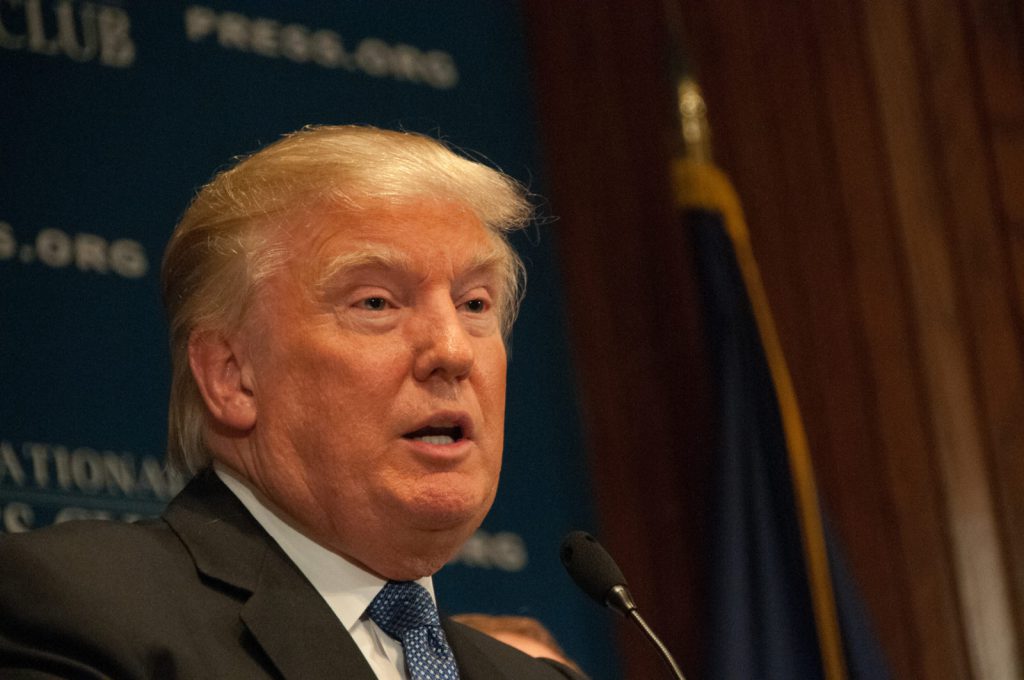
Published June 10, 2016
The Republican Party’s politically lethal embrace of Donald J. Trump is very nearly complete.
In endorsing Mr. Trump earlier this month, Paul Ryan, the speaker of the House, stipulated that while he and Mr. Trump have their differences, “we have more common ground than disagreement.” A President Trump, he argued, will help turn the agenda of the Republican House of Representative into laws.
In a recent interview, Mitch McConnell, the Republican Senate majority leader, said that whether or not Mr. Trump believes in limited government, “he’s not going to change the Republican Party,” adding that “he’s not going to change the basic philosophy of the party.”
Both Mr. Ryan and Mr. McConnell are capable and impressive; Donald Trump is just about the last person they were hoping would be their party’s presidential nominee. But he is, and Mr. Ryan and Mr. McConnell are expressing the hope of Republicans who have been wary of Mr. Trump: that somehow, deep down, he embraces the principles of the pre-Trump Republican Party. Or that even if he doesn’t, he can be cajoled or pressured into adopting them. Either way, the damage that Mr. Trump threatens to do to the Republican Party can be contained. The argument is that even if you don’t particularly like or trust Mr. Trump, he will not redefine the Republican Party.
But he already has. Donald Trump, the Republican Party’s presumptive nominee, is waging an open attack on what have long been the party’s core views.
For at least three decades Republican politics have been defined by the centrality of conservatism in the party’s governing philosophy. Modern conservatism has three elements: a commitment to limited government and economic liberty that enables prosperity; moral traditionalism that conserves our capacity for liberty by producing responsible citizens; and a belief that America, confidently and carefully engaged in international affairs, can be a force for good in the world.
Mr. Trump rejects all three.
Over the course of his nearly 70 years, and this primary campaign is no exception, Mr. Trump has shown no real desire to limit the size, cost or reach of the federal government. He has no interest in economic liberty as it has been understood since Adam Smith. He wants an economy in which trade and immigration are tightly restricted and the government makes mercantilist deals on behalf of large domestic producers.
Mr. Trump is the very embodiment of the culture of narcissism and decadence that moral traditionalism exists to counteract. Republicans used to argue that character mattered in our political leaders. But apparently that applied only to Democrats like Bill Clinton. Today, we’re told such considerations are irrelevant, inapposite, quaint. We’re electing a president rather than a pope, after all, so there’s no problem wrapping Republican arms around a moral wreck. At least he’s our moral wreck.
The hypocrisy isn’t lost on anyone.
And Mr. Trump wants America to further retreat from world affairs. He believes the United States is too weak to shape events. Rather than reach out to allies, he wants to bludgeon many of them, even as he has shown a disturbing affinity for tyrants. Mr. Trump also wants Americans to think about global affairs in terms of financial transactions that net America money rather than relationships that promote security, freedom and order — and therefore advance American interests.
Why, then, are Republican leaders and lawmakers unifying behind a man whose views they find offensive? For some, like Mr. Ryan, it is an effort to use his influence to pull Mr. Trump in a more conservative direction. For others, it is simple party loyalty. For still others, it is fear of opposing a winner, the most powerful figure in the Republican Party. And of course many Republicans find Mr. Trump distasteful but believe he would be a better president than Hillary Clinton.
But the reality is that Republican lawmakers have been put in this position because Mr. Trump was more popular among Republicans than anyone else in the race. He took the lead in the national polls in July 2015 and pretty much never lost it. Those of us who oppose Mr. Trump need to acknowledge that his European-style ethnic nationalism, which relies on stoking grievances, resentments and fear of the other — Mexicans, Muslims, Syrian refugees, the Chinese, etc.— has a powerful sway in the Republican Party today. To be clear, not all of Mr. Trump’s supporters are drawn to his ethnic nationalism. But all of his supporters are willing to accept it.
This is not the conservatism of William F. Buckley Jr. or Ronald Reagan or Jack Kemp; it is blood-and-soil conservatism primarily aimed at alienated white voters who believe they have lost the country they once knew. Trumpism also includes a heavy dose of conspiracy theories. It is no coincidence that Mr. Trump burst onto the national political scene in 2011 by claiming that Barack Obama, our first black president, was not a natural-born American citizen but rather was born in Kenya.
Mr. Trump knows his target audience, which explains why, beginning the morning of the Indiana primary on May 3 (the day he became the de facto nominee), he has — among other in-the-gutter moments — implied the Senator Ted Cruz’s father was implicated in the assassination of President Kennedy, insinuated that Vince Foster, a friend of the Clintons who was White House deputy counsel, was murdered (five official investigations determined that Mr. Foster committed suicide), engaged in a racially tinged attack on Gonzalo Curiel, a district court judge presiding over a fraud lawsuit against Trump University, and expressed doubt that a Muslim judge could remain neutral in the case. This is conspiratorial craziness and rank racism — and all of it has happened after we were told Mr. Trump would raise his game.
The surprise is that so many Republicans are now expressing consternation at what Mr. Trump is doing. Has any recent presidential candidate ever advertised quite as openly as Mr. Trump the kind of vicious attacks he’d engage in? We were warned in neon lights what was coming. The idea that he will now engage in a “course correction” — that he will flip a switch and transform himself into a decent and dignified man — is laughable. Mr. Trump has repeatedly stated that he won’t change his approach. (“You win the pennant and now you’re in the World Series — you gonna change?”) In this one area, Republicans should take him at his word.
When a narcissist like Mr. Trump is victorious, as he was in the Republican primary, and when he has done it on his terms, he’s not going to listen to outside counsel from people who think they can change the patterns of a lifetime. Republicans have not changed Mr. Trump for the better; he has changed them for the worse.
So here we are, with Republicans who lined up behind Mr. Trump now afraid of being led off a high cliff. If the prospect of a November shellacking isn’t enough to unnerve these Republicans, there’s also this to factor in: What we are talking about is potential generational damage to the Republican Party.
Consider this historical comparison: In 1956 the Republican nominee, Dwight D. Eisenhower, won nearly 40 percent of the black vote. In 1960, Richard Nixon won nearly a third. Yet in 1964, in large part because of his opposition to the Civil Rights Act, Barry Goldwater (who was no racist) won only 6 percent. More than a half-century later, that figure has remained low. Mr. Trump — through his attacks against Hispanics that began the day he announced his candidacy — is doing with Hispanics today what Senator Goldwater did with black voters in the early 1960s.
The less resistance there is to Mr. Trump now, the more political damage there will be later.
The stain of Trump will last long after his campaign. His insults, cruelty and bigotry will sear themselves into the memory of Americans for a long time to come, especially those who are the targets of his invective.
Mr. Trump is what he is — a malicious, malignant figure on the American political landscape. But Republican primary voters, in selecting him to represent their party, and Republican leaders now rallying to his side, have made his moral offenses their own.
There will be a fearsome price for Republicans to pay for their embrace of Donald Trump. Especially after the attacks on Judge Curiel, Mr. Ryan and Mr. McConnell, decent men who have already criticized Mr. Trump harshly, should rescind their endorsement of him — as Mr. McConnell just hinted that he might. Mr. Trump’s bigotry should earn him their enmity, not their loyalty.
Peter Wehner, a senior fellow at the Ethics and Public Policy Center, served in the last three Republican administrations and is a contributing opinion writer.








